"They got all kinds of laws - they even got laws to help you out, too."
Frank Enley seems to have it made. A successful businessman, husband, father, WW2 veteran and survivor of a German POW camp, and respected member of the Santa Lisa, CA community.
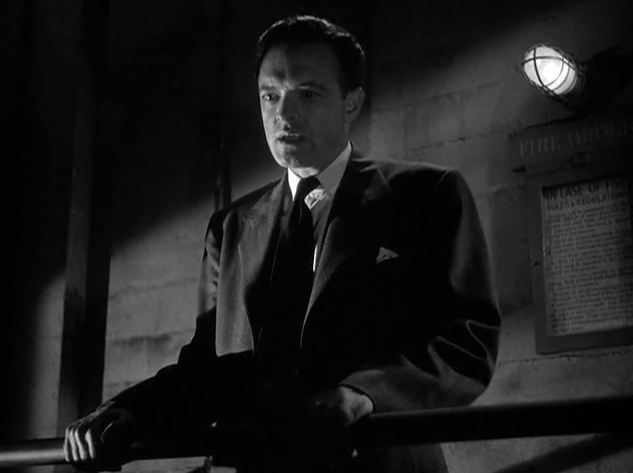  |
| Frank and Edith Enley. |
Neither his wife nor the rest of the community know Frank's dark secret. When he was in the POW camp, he alerted the Nazi camp commander of an escape attempt. He was rewarded with food and assured his comrades' lives would be spared. They weren't. The Nazis set a trap and slaughtered them in the tunnel they built - all but one, Joe Parkson, who faked death until he could crawl away.
 |
| Who reads about his "war hero" friend Frank in the paper. |
Frank never told his wife what really happened, nor that they moved from the east coast basically to get away from Parkson, who hates Enley for what he did.
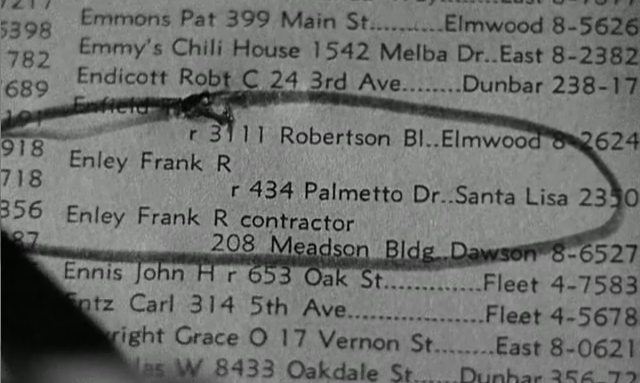 |
| Parkson finally tracks him down with the help of the war-hero article and the local phone book. |
This leads to Parkson doing the whole calling up the Enley residence and hanging up business.
 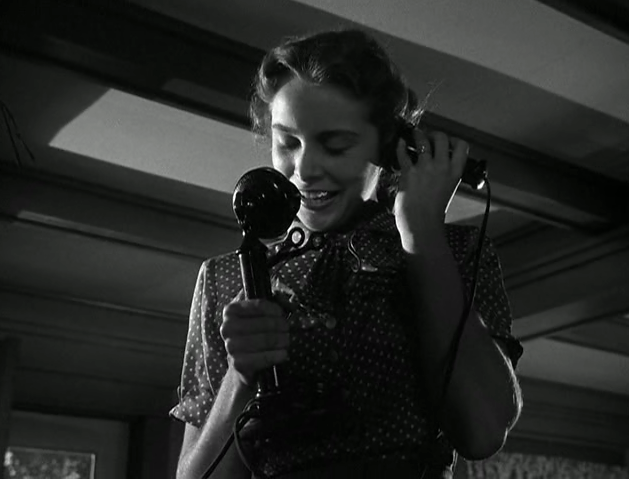 |
| Apparently, the Enleys never upgraded their phone after the war. Tangent: I miss phones. I would totally go back to the phone Janet Leigh is holding. Enough's enough, planet Earth. |
Not content to simply prank call, Joe follows Frank when he leaves for a fishing weekend at Redwood Lake.
I was genuinely surprised by Joe's readiness to kill here - he doesn't seem interested at all in confronting his former commanding officer, just straight-up assassinating him. Frank ends up taking a different route out of the cove and doesn't realize how close he came to death. He learns of Joe on his tail, though, and from this point on, things unravel.
Act of Violence is one of the first post-WW2 films to depict an unresolved trauma among veterans of the Great War Redux so recently ended. The specific plot details of Joe's and Frank's POW experience aside, it's an exploration of an anxiety a large portion of its 1948 audience knew all too well. It's an interesting title for those reasons - the "act of violence" isn't confined to Frank's actions at the POW camp. It's what was done to an entire generation of Americans.
Not to mention non-Americans, of course. Director Fred Zinnemann came to America in 1938 to escape the Nazis; his parents weren't so lucky. They delayed leaving, then couldn't, then were murdered in the camps. Whether this impacted his directorial choices or not, Act of Violence is steeped in Survivor's Guilt.
The relationship between Edith and Frank - and the myth-shattering intrusion of Joe on their marriage - is worth looking at.
  |
| At first, he's preoccupied with her not finding out. |
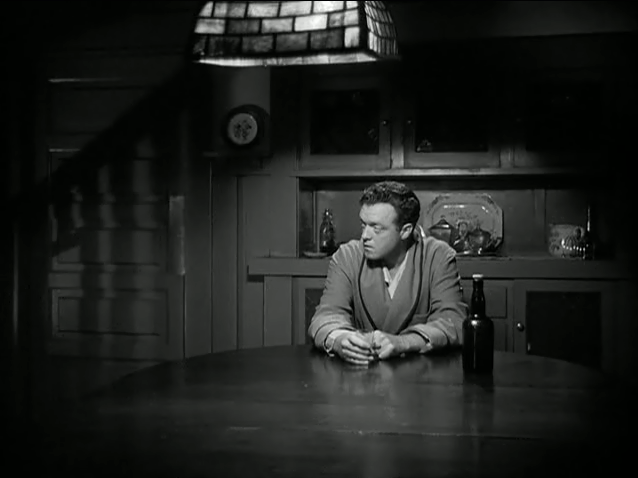 |
| Once she forces the issue, he makes up a story and skips town. |
  |
| Eventually she gets the whole truth from him, but he can't bear her knowing and skips out once again. |
  |
| Throughout it all, kudos to Janet Leigh, who really anchors the movie with her performance. |
Frank's descent into alcoholic despair is conveyed via a fantastic montage of skewed angles and long shadows, courtesy of:
 |
| Surtees has a helluva c.v. |
It is during this descent that Frank meets Pat, an aging prostitute played by Mary Astor. She takes somewhat incredulous pity on him and introduces him to someone who can make his problems go away for a mere eight to ten grand.
As mentioned at Classic Film Review, "Astor turns in a weighty
supporting performance as Pam, bringing a palpable sadness to the role. When she finds out what Frank's done, what
he's running from, helping him is just another in a long series of failures for her."
 |
| Things unfold inexorably. |
 |
| I'll refrain from spoiling the end. |
What a film. On one hand it's the prototypical film noir, where the protagonist is caught in a downward spiral of effects from some causal action from the past. On the other, though, it stands apart - there's no real femme fatale, unless you count Mary Astor, which doesn't quite work, and there's no voice-over at all.
  |
| This is especially noticeable at the beginning, during Joe's cross-country bus journey to California. |
 |
| I kept expecting some kind of "Here's what it is, see" voiceover from Robert Ryan. |
 |
| Instead, he just looks weary and driven. |
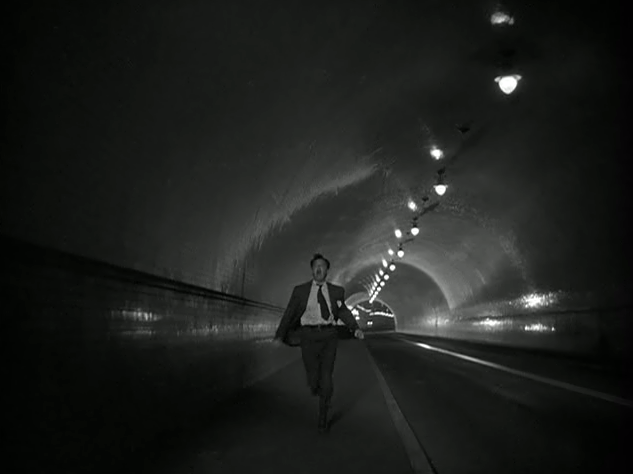 |
| The only voice-over comes later, when Joe is flipping out and remembering both his complicity in hiring the hit man and the German loudspeakers. Very effective. |
 |
| While we're here, when Joe lands in California, he's prevented from limping across the street by a passing parade of war heroes. |
A very intelligent film, beautifully performed, and beautiful to look at.
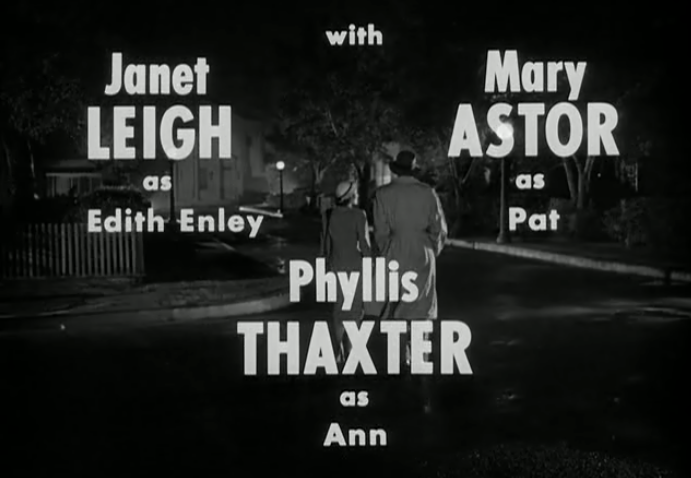 |
| with a |
 |
| and was |









































Jeez Louise...! There are some really good movies on Fred Zinneman's filmography! Why isn't he talked about more?
ReplyDeleteWhat sort of reception did this movie get? Seems like the sort of thing that audiences of the day wouldn't have had any clue what to do with.
I've never seen it, myself; sounds excellent, though.
It's a good question. I don't think it was a particular hit at the time, but (thank you, France!) was hailed as a masterpiece after the French championed film noir. Whether that translated to une grosse somme d'argent (I was going to write "mucho dinero" but figured I'd stick with le francais) I'm not sure. Its reputation is pretty solid, though, deservedly. As for me, I'd say the audience would know what to do with it, since 1 out of 3 Americans had PTSD in 1948 or lived with someone who did, even if the terminology wasn't yet understood (if it even is now) but the marketing dept. at the studio probably had little clue, to be sure.
Delete(1 out of 3 statistic not an actual statistic, just a stab in the dark. Just saying that the anxiety and state of mind of most film noirs seemed to reflect a national mood at the time.)
Meh - now that I think about for a minute, recognizing one's anxiety on-screen is a far cry from knowing what to do with a film, so I have to agree: I doubt many people knew what to do with it at the time, marketing, audience, whomever.
It's true re: Zinnemann! Fame is so fickle.
Another film I haven't seen and am now hoping to catch sometime.
ReplyDeleteI don't know how many film noirs there are out there that dealt with the with the trauma's of WW II, however it doesn't surprise me that the genre would tackle the subject.
In a review I once read for Shutter Island, it might have been Roger Ebert or someone else, it was pointed out that the noir genre blossomed in part as a response to the trauma of the war. Because of said trauma we have at least three films (counting this one) that I'm aware of and that tackle the problem of war induced PTSD, or at least the various fallouts that could await some unlucky ex G.I.
"Thieves Highway by Jules Dassin, about a returning serviceman who finds his family has run afoul of racketeers and the rest of the film unfolds as a revenge plot that costs him his girl, and it's hard to tell what the protagonist gains as a result.
The another is another film featuring another Frank and the problem if war heroes gone crazy, plus a pre-JFK assassination plot. I'm talking here of 1954's "Suddenly", featuring Frank Sinatra and Sterling Hayden.
That's as far as my knowledge on this kind of film extends I'm afraid, sorry.
What I do know is that I'm convinced both Lost Highway and Mulholland Dr. are Lynch's riffs on "Detour", at least there's one way of looking at it.
ChrisC
Very interesting take on Lost Highway and Mulholland Dr. - I'll keep that in mind next time I see either of those.
DeleteSuddenly is a fantastic movie. I've only seen it once, but I've got it on my wish list. Definitely a damn interesting film and way ahead of its time. Sinatra thought that one was going to take him to the next level of an actor, I'm told, and was somewhat bitter about it's not doing so. As a result, he trashed it in some interviews, and it took a long time for its rep to rehabilitate.
Haven't seen Thieves Highway, but a) awesome name for a noir, and b) sounds totally up my alley.
"about it's not doing so"
Delete* its
That immediate post-war period is so perfect for Noir.
ReplyDeleteI haven't seen this one, but you've piqued my interest. It almost seems like something Sam Fuller would have done, though Fuller's affection for his fellow dogfaces seemed to keep him from portraying any of them as cooperating with the enemy in any sense.
Man, the more I think about this post, the more I want to do a marathon of Noir and near-Noir set in the immediate and near post-war period. This, Verboten!, and...well, I can't think of any right off the top of my head right now. But at least three for a marathon.
I bet Sam Fuller and Jack Kirby would've gotten along. I'd love to set up one of those host-a-dinner programs circa 1965 or so and sat around with them, lighting cigars and listening to their stories and ideas. Throw in Jim Steranko and you've got yourself a happening and a half.
DeleteI never saw Verboten!, actually, I need to rectify that.